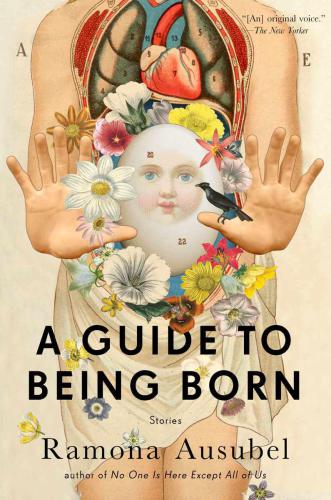
A Guide to Being Born
Stories
کتاب های مرتبط
- اطلاعات
- نقد و بررسی
- دیدگاه کاربران
نقد و بررسی

February 18, 2013
Ausubel follows up her debut novel, No One is Here Except All of Us, with a charming, at times precious collection of stories that tackles the frustrations and fantasies of being alive. Split into four parts—birth, gestation, conception, and love—the volume deposits characters in a real world gone awry, a place where true adoration is accompanied by the growth of additional “love-arms,” men sprout drawers of bone in their chests, and the ghosts of Civil War generals play catch with youngsters. Dabbling frequently in broken families, the author’s greatest triumphs come in narratives that weave the defeated with the absurd. “Atria” finds a pregnant teenager convinced her growing baby will not be human, and in “Snow Remote,” a family practices strange habits, from manning an elaborate Christmas display to engaging in phone sex—all while living under the clouded memory of a lost matriarch. Quite often, and with great effect, the misplaced and aimless find solace. Still, the quirk factor occasionally works overtime, leading to eccentric character-naming (Mother Mom; Professor Paul Pretoria) and jarringly peculiar moments, like in “Saver,” when a character performs an impromptu dental inspection on a first date. Agent: PJ Mark, Janklow & Nesbit.

March 1, 2013
Lyrical stories arranged around themes of birth, gestation, conception and love--yes, in that order. "Poppyseed," from the section entitled Birth, presents a dual narrative in which a father gives us a relatively objective perspective and a mother a far more subjective one on their severely incapacitated daughter, Poppy. A doctor has proposed using Poppy as a surgical experiment, and his puffed-up view of himself reduces her status to that of a laboratory animal, in contrast to the heartbreaking surge of love the parents experience. "Chest of Drawers" takes us into the realm of the surreal, for here, the husband of a pregnant woman does indeed find little drawers growing in his chest, and in them, he begins to carry small items (such as his wife's lipstick) as well as small dolls that distortedly mirror his wife's condition. In "Atria," Hazel Whiting loses her virginity to Johnny, a clerk at the 7-Eleven, and shortly thereafter is raped by another man. When she becomes pregnant, her status increases when people believe she's carrying the child of a rapist even though Johnny is the father. Buck, a girl in "Catch and Release," is a talented athlete who wants to grow up to be a baseball player. Actually named after first lady Mamie Eisenhower, Buck loves her nickname but never discovers its sordid origin--when her wayward father, Pops, found out Buck's mother was pregnant with her, he contemptuously threw a dollar bill on the bed, calling out "This is my contribution! Call that baby Buck, 'cause that's all he's worth!' " Ausubel has a gift of language so rich that even the most mundane events are invested with poetry, and many of her characters are in need of all the poetry they can muster.
COPYRIGHT(2013) Kirkus Reviews, ALL RIGHTS RESERVED.

May 1, 2013
Ausubel follows up her debut novel, No One Is Here Except All of Us, with this collection of 11 short stories that are arranged according to the stages of life--birth, gestation, conception, and love--but not in a literal-minded way. Birth (which in one story oddly resembles death by way of an ocean voyage) and gestation precede conception, and throughout, key life events appear in an odd, even surreal light. In "Tributaries," for instance, people grow an extra arm each time they fall in love, while in "Chest of Drawers," a man gives birth to a piece of furniture, with drawers sitting in his own chest and holding small items emblematic of his wife's pregnancy. In "Catch and Release," which is set in the present day, a dead Civil War general (not a ghost, he says) plays catch with a girl nicknamed Buck, as in dollar bill. VERDICT Using a light touch and surprising wit as she weaves together elements of fantasy and folk legend, Ausubel wills a suspension of disbelief while illuminating life's common passages. This eye-opening book will appeal to short story readers as well as to fans of fantasy and young adult fiction (with a caveat that some stories are openly sexual).--Sue Russell, Bryn Mawr, PA
Copyright 2013 Library Journal, LLC Used with permission.

April 15, 2013
In 11 short stories put seemingly arbitrarily into the categories birth, gestation, conception, and love, Ausubel probes major events and turning points in life and beyond. Ausubel's world tends toward the fantastic, as when she posits the human body responding bizarrely to emotion. In Chest of Drawers, a husband's upper body reacts physically to the emptiness he feels during his wife's pregnancy, and in Tributaries, love causes people to grow arms or at least hands; one woman's upper torso is covered with such appendages, which undulate beneath her clothing. The shortest story, The Ages, is also among the most moving; a young couple take time from sex to watch the older people in their community, where power walking still waited ahead in a future that the unretired hoped would also include polished golf clubs and visits to only the most comfortable of foreign nations. Author of the acclaimed No One Is Here Except All of Us (2012), Ausubel is a master stylist of vibrant, concise prose, and these stories, with love most often at their cores, can be appreciated for that alone.(Reprinted with permission of Booklist, copyright 2013, American Library Association.)

























دیدگاه کاربران